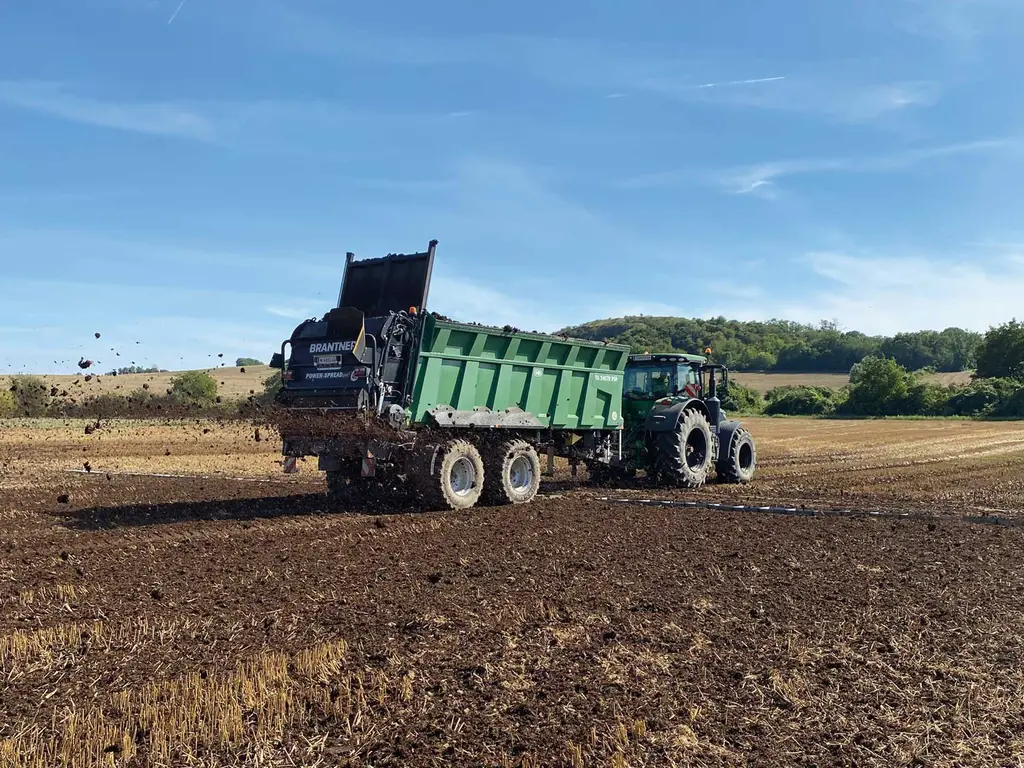Download print version
Test report 6886
The approval
A test mark “DLG-APPROVED for single, value-determining criteria” is awarded for agricultural products which have successfully fulfilled a reduced usability testing conducted by the DLG according to independent and recognised evaluation criteria. The test is served to highlight particular innovations and key criteria of the test object. The test may contain criteria from the DLG test frame for total tests, or focus on other value-determining characteristics and properties of the subject of the test. The minimum requirements, the test conditions and procedures, as well as the bases of evaluation of the test results are set in agreement with a DLG Experts group. They correspond to the recognised rules of technology as well as the science and agricultural knowledge and requirements. A successful test ends with the publication of a test report and the awarding of the test mark, which is valid for five years from the date of the award.
The DLG test for “Precision of NIR sensors for the determination of ingredients in passing liquid pig manure of animal origin and liquid digestate“ was carried out on the JOHN DEERE HarvestLab 3000 with software version 132, and the calibration model LKS 04/18.
The measurements for determining the contents of ingredients were carried out in liquid digestate.
Five different practice slurries were examined through the tested HarvestLab sensor for their levels of dry matter content (DM in weight %) and other important ingredients, for example total nitrogen (NTotal in kg/m3). During the measurements each slurry sample was collected.
The taken samples were analysed by five different accredited specialised laboratories, preferably with wet-chemical methods and threefold repetition. For each ingredient, the averages from the results of the laboratory analyses were calculated. For the evaluation, the differences between the value measured by the NIR Sensor and the mean value of the laboratories were determined as the relative measurement
deviation. The precision of the sensor was examined at different flow rates too.
Other criteria were not tested.
Assessment – brief summary
On the basis of the results the mobile NIR sensor “JOHN DEERE HarvestLab 3000 with the Software version 132, and the calibration model LKS 04/18” is awarded the DLG test mark “DLG APPROVED in single criteria” in the measurement of ingredients in liquid digestate for the parameters listed in the following table 1.
The product
Description and technical data
John Deere Harvestlab 3000 NIR sensor is a measuring system to determinate the ingredients. It is on offer for choppers, slurry tankers and for stationary use. For each implementation an appropriate calibration model is needed.
With the software version 132 and the calibration model LKS 04/18 the sensor is equipped for liquid pig manure.
The Harvestlab 3000 flexibly can be used on different slurry tankers and branches. To ensure correct functionality the installation instructions has to be followed.
The HarvestLab 3000 NIR sensor allows the measurement of ingredients in real time. It is capable of having more than 4,000 measuring points per second. Measurements are able during the filling of the tank but also while application in the field.
This allows the application of the liquid manure based on a target quantity (kg/ha) of a single ingredient and an optional maximum amount of a second ingredient, or based on a predetermined application map.
All recorded nutrient values, application rates and application amounts are displayed on the fully integrated GS3 2630, Gen4 4600 CommandCenter and the 4640 Universal Display, and at the same time up to four different values are site specific recorded.
Using the wireless Data transfer (WDT) from John Deere the documented data can immediately transmitted via mobile for data storage, further analysis or common use with customers or agronomic advisers to the John Deere operations center.
Advantages of the HarvestLab 3000 Near Infrared Technology:
- High accuracy through multiple readings
- Measurement during application
- Analysis of the whole substrate instead of just single sampling
- Simultaneous analysis of several ingredients
- Non-destructive measurement
- Application according to target rate and marginal rate or according to prescription map
- Adjustment of nutrient delivery rate by automatic speed and flow rate control
Method of near-infrared measurement (see picture 2):
A light source (A) projects a beam directly onto the substrate or manure passing the lens of the sensor (B). Parts of the light are absorbed and the rest of the light is reflected. The reflected portion is detected and with a subsequent calculation the HarvestLab 3000 Sensor (C) can determine the dry matter content and the ingredient values. The manufacturer specifies the measurement ranges listed in Table 2 for the calibration model used in the system.
The method
The aim of the DLG Test „Precision of NIR sensors for the determination of ingredients in passing liquid manure of animal origin and liquid digestate“ is to examine the accuracies of mobile sensors in conjunction with appropriate calibration models in comparison to laboratory analysis with officially recognised methods.
A major advantage of NIR measuring technology compared to the conventional methods for the determination of ingredients in liquid manures through sampling and laboratory analysis, consist in the immediate availability of measurement results, and in the permanent measurement of the ingredients along the complete manure volume.
The scope in the DLG Test is limited on substrates, which are described as manure according to the Fertilizer Act (DüG), so on cattle manure, pig manure and liquid digestate.
The DLG test is available for the measurement of the following ingredients:
- Dry matter content (DM in % weight)
- Total Nitrogen amount (NTotal in kg/m3)
- Ammonium nitrogen amount (NH4N in kg/m3)
- Phosphate content (Phosphorpentoxid; P2O5 in kg/m3)
- Potassium content (Kaliumoxid; K2O in kg/m3)
In order to cover a wide range of applications, the test attempts to use a diverse spectrum for each type of substrate:
- Cattle manure: 4 % - 9 % DM, where possible from dairy cows and fattened cattles
- Pig manure: 2 % - 7 % DM, where possible from sow-keeping and fattened pigs
- Liquid digestate: 5 % - 8 % DM
The DLG approval can be awarded for individual types of manure and individual ingredients. To get a DLG recognition, at least the requirements for the measurement of the total nitrogen content need to be met. When the requirements for the measurement of the total nitrogen content are fulfilled, other ingredients can be freely chosen.
The process
Depending on each type of manure (cattle manure, pig manure, liquid digestate) five individual samples that are as diverse as possible are measured and sampled on different farms. For this purpose, a subset of 3 m3 to 5 m3 is pumped from the previously stirred slurry storage in an intermediate tank.
At the intermediate tank, a pump and a common piping system are installed. On the piping system one or more sensors to be tested, a flow meter for the control of flow rates, and a bypass for sampling are attached (see figure 3).
In a preliminary phase the collected manure is intensively homogenised in the intermediate tank by continuous circulation in a closed circuit.
Following this preliminary phase, the measured values of the sensor are documented. Afterwards sub-samples for the reference analyses are then taken via the bypass while maintaining inflation around the closed circuit. In order to determine any possible influence on the sensor values, subsequently the flow velocity is varied and the measured values are re-documented.
The manure samples are clearly marked, frozen and stored frozen. Five suitable laboratories are commissioned with the reference analysis. Each laboratory receives at least three partial samples of each manure. The analyses in the laboratory must be carried out using officially recognised methods, preferably wet-chemical methods.
For each manure and each ingredient, the arithmetic mean value is calculated as a reference value from the laboratory results. The assessment of accuracy is based on the relative deviations from the sensor value in comparison with the reference value.
The test results in detail
The trials were conducted 2018 in the surrounding area of the DLG Test Center at Gross-Umstadt.
Flow rates from 6 m3/min to 9 m3/min were set during the measurements. The different flow rates showed no influence on the measured values of the sensor. In table 3 the individual results are given.
Based on the obtained results, the mobile NlR Sensor “JOHN DEERE HarvestLab 3000 with the software version 132 and the calibration model LKS 04/18” is awarded the test mark “DLG-APPROVED in individual criteria” for the measurement of:
- Ingredients in cattle manure: DM, NTotal, P2O5
Table 3: Individual results
| Type designation | JOHN DEERE HarvestLab 3000 | Evaluation* |
|---|---|---|
| Software version | 132 | |
| Calibration Model | LKS 04/18 | |
| Installation position (tilt) | 90° | |
| Installation position | horizontal 6“ pipe | |
| Cattle manure | DM in % by weight | + |
| NTotal in kg/m³ | ◯ | |
| P2O5 in kg/m³ | ◯ |
* DLG-assesment scheme:
+ + = passed, very good (4/5 value pairs within a manure type ≤ 10 % and no > 20 % rel. deviation)
+ = passed, good (4/5 value pairs within a manure type ≤ 15 % and no > 25 % rel. deviation)
◯ = passed (3/5 value pairs within a manure type ≤ 25 % and no > 35 % rel. deviation)
The NIR sensor “JOHN DEERE HarvestLab 3000 with the Software version 132, and the calibration model LKS 04/18” fulfilled the requirements for DLG approval in the accuracy of of dry matter (DM), total nitrogen (NTotal), and phosphorous pentoxide (P2O5) in liquid pig manure.
A major advantage of NIR measuring technology compared to the conventional methods for the determination of ingredients in liquid manures through sampling and laboratory analysis, consist in the immediate availability of measurement results, and in the permanent measurement of the ingredients along the complete manure volume.
Manufacturer and applicant
JOHN DEERE GmbH & Co. KG, Intelligent Solutions Group,
Straßburger Allee 3,
67657 Kaiserslautern
Germany
Product:
JOHN DEERE HarvestLab 3000
with software version 132 and the calibration model LKS 04/18
Test performed by
DLG e.V.
Test Center Technology and Farm Inputs,
Max-Eyth-Weg 1, 64823 Groß-Umstadt, Germany
Chamber of Agriculture of North-Rhine Westphalia, Germany (LWK Nordrhein-Westfalen)
Teaching and research Institute Riswick,
Elsenpass 5, 47533 Kleve, Germany
DLG test scope
DLG-APPROVED for single, value-determining criteria
“Precision of NIR sensors for the determination of ingredients in passing liquid manure of animal origin and liquid digestate” (current as of 07/2017)
Department
Technology for outdoor work equipment
Members of the competent DLG Test Commission “Fertilising Technology”
Dr. Horst Cielejewski, Chamber of Agriculture of North Rhine-Westphalia
Dr. Harm Drücker, Chamber of Agriculture of Lower Saxony
Prof. Nils Fölster, University of Osnabrück
Prof. Hans W. Griepentrog, University of Hohenheim
Dr. Fabian Lichti, State Institute of Agriculture Bavaria
Frank Reith (farmer), Groß-Umstadt
Prof. Bernd Scheufler, University of Osnabrück
Sven Schneider (farmer and contractor), Brensbach
Peter Seeger (farmer), Otzberg
Head of Department
Dr. Ulrich Rubenschuh *
Test engineer(s)
Dipl.-Ing agr. Georg Horst Schuchmann
* Author
Contact us
DLG TestService GmbH - Groß-Umstadt location • Max-Eyth-Weg 1 • 64823 Groß-Umstadt • Tel: +49 69 24 788-600 • tech@DLG.org














